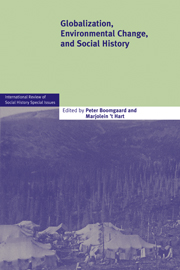Book contents
- Frontmatter
- Contents
- Notes on Contributors
- Globalization, Environmental Change, and Social History: An Introduction
- The El Dorado of Forestry: The Eucalyptus in India, South Africa, and Thailand, 1850–2000
- The Mid-Atlantic Islands: A Theatre of Early Modern Ecocide?
- Environmental Change and Globalization in Seventeenth-Century France: Dutch Traders and the Draining of French Wetlands (Arles, Petit Poitou)
- The Colonial Famine Plot: Slavery, Free Trade, and Empire in the French Atlantic, 1763–1791
- Environmental Changes, the Emergence of a Fuel Market, and the Working Conditions of Salt Makers in Bengal, c. 1780–1845
- Industrial Life in a Limiting Landscape: An Environmental Interpretation of Stalinist Social Conditions in the Far North
- “Pumpkins Just Got in There”: Gender and Generational Conflict and “Improved” Agriculture in Colonial Zimbabwe
- Hydro-businesses: National and Global Demands on the São Francisco River Basin Environment of Brazil
- Bibliography
Environmental Changes, the Emergence of a Fuel Market, and the Working Conditions of Salt Makers in Bengal, c. 1780–1845
Published online by Cambridge University Press: 05 June 2012
- Frontmatter
- Contents
- Notes on Contributors
- Globalization, Environmental Change, and Social History: An Introduction
- The El Dorado of Forestry: The Eucalyptus in India, South Africa, and Thailand, 1850–2000
- The Mid-Atlantic Islands: A Theatre of Early Modern Ecocide?
- Environmental Change and Globalization in Seventeenth-Century France: Dutch Traders and the Draining of French Wetlands (Arles, Petit Poitou)
- The Colonial Famine Plot: Slavery, Free Trade, and Empire in the French Atlantic, 1763–1791
- Environmental Changes, the Emergence of a Fuel Market, and the Working Conditions of Salt Makers in Bengal, c. 1780–1845
- Industrial Life in a Limiting Landscape: An Environmental Interpretation of Stalinist Social Conditions in the Far North
- “Pumpkins Just Got in There”: Gender and Generational Conflict and “Improved” Agriculture in Colonial Zimbabwe
- Hydro-businesses: National and Global Demands on the São Francisco River Basin Environment of Brazil
- Bibliography
Summary
Summary: During the late eighteenth and early nineteenth centuries, the British East India Company monopolized salt production in Bengal, and the British sought a new market for English salt in India. As previous studies have emphasized, external political and economic forces devastated indigenous industry and its workers. However, working conditions were influenced more by the natural environments of the salt-producing localities, particularly the availability of fuel, which was indispensable to the process of manufacture. The industry had always benefitted from abundant grass and straw for use as fuel. However, as grasslands were lost due both to constant river encroachment and to land clearance for cultivation, straw prices increased with the emergence of a regional market for biomass fuels, so that increasing difficulties in procuring fuel gradually made the salt industry costly. That state of affairs was accelerated by the advance of economic activity in general and a shortage of coal in particular. The changes made workers much more dependent on the fuel market.
INDIGENOUS INDUSTRY IN THE AGE OF EXPANSION OF GLOBAL TRADE
In Indian history, the late eighteenth to the early nineteenth century was a period when the British East India Company [hereafter, the Company] gradually consolidated its rule over India by securing stable sources of revenue. Simultaneously, world trade expanded under the free trade system and the internal Indian market became increasingly connected to the world market.
- Type
- Chapter
- Information
- Globalization, Environmental Change, and Social History , pp. 123 - 152Publisher: Cambridge University PressPrint publication year: 2011

